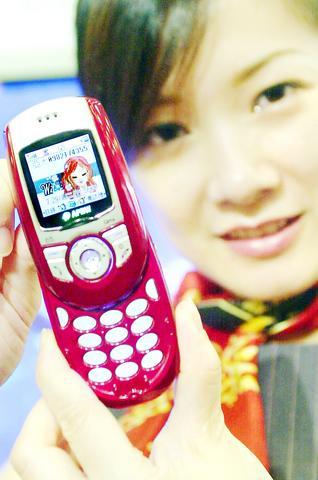While Asia Pacific Broadband Wireless Communication Inc (亞太行動寬頻) was celebrating its launch of the nation's first third-generation (3G) mobile services yesterday, telecom industry analysts said the high-speed mobile Internet service is not expected to become mainstream in the market in the short term.
"The migration from current mobile service to advanced 3G services is a global trend," said Jason Lin (
Lin said flatly that the chances of 3G services gaining significant popularity in Taiwan by 2005 are very low.

PHOTO: AP
Asia Pacific, a subsidiary of fixed-line phone company Eastern Broadband Telecom Co (東森寬頻), yesterday started to offer the 3G mobile phone services -- such as movie previews, video games, or real-time news reports, targeting its sales especially at young people, businesspeople and professionals.
But Asia Pacific's high 3G handset price may scare consumers away.
Currently, Asia Pacific offers customers the Samsung X789 handset for NT$20,500 and the SK Telecom AP1000 for NT$13,500, plus a two-year subscription.
"It's not necessary for me to spend more than NT$10,000 to buy a new handset and have another phone number," said Elisa Pai, 26, a Taiwan Securities Co (台証證券) employee.
"I only use my cellphone to talk and sometimes send text messages, so I don't need those fancy services," she said.
Consumers' low demand for mobile data service is the major hurdle.
"Taiwanese like to get online, but they prefer to access the Internet at home or at the office rather than on the move," Lin said.
Mobile Internet data services such as sending short messages and checking e-mail from handsets only account for 3 percent of service operators' total revenues.
"Therefore voice service will still dominant local mobile phone market for several years, though we have 3G service now," Lin added.
Meanwhile, another market analyst poured cold water on Asia Pacific yesterday, saying its plan to attract more than 700,000 users by the end of year would be a Herculean task.
"In order to reach that target, the company has to lure more than 12,000 subscribers each month from now," said Nathan Lin (林宗賢), a telecom analyst at SinoPac Securities Corp (建華證券) in Taipei.
But with the local mobile market virtually saturated, room for expansion is limited, he said.
Lin said that even Chunghwa Telecom Co (
Another factor that may hurt new subscriptions to Asia Pacific is that the company offers fixed-number handsets only, Chiao Tung University's Lin said.
Most mobile phones used in Taiwan enable users to change phone numbers by switching SIM (subscription identification module) cards, but Asia Pacific bundles each handset with a specific phone number and customers must go to an Asia Pacific service center to change numbers, he explained.
Only 23 Asia Pacific service centers have been set up around the nation.
"The inconvenience will lower its attractiveness, because people like to use new handsets but to retain the same numbers," Lin said.

Intel Corp chief executive officer Lip-Bu Tan (陳立武) is expected to meet with Taiwanese suppliers next month in conjunction with the opening of the Computex Taipei trade show, supply chain sources said on Monday. The visit, the first for Tan to Taiwan since assuming his new post last month, would be aimed at enhancing Intel’s ties with suppliers in Taiwan as he attempts to help turn around the struggling US chipmaker, the sources said. Tan is to hold a banquet to celebrate Intel’s 40-year presence in Taiwan before Computex opens on May 20 and invite dozens of Taiwanese suppliers to exchange views

Application-specific integrated circuit designer Faraday Technology Corp (智原) yesterday said that although revenue this quarter would decline 30 percent from last quarter, it retained its full-year forecast of revenue growth of 100 percent. The company attributed the quarterly drop to a slowdown in customers’ production of chips using Faraday’s advanced packaging technology. The company is still confident about its revenue growth this year, given its strong “design-win” — or the projects it won to help customers design their chips, Faraday president Steve Wang (王國雍) told an online earnings conference. “The design-win this year is better than we expected. We believe we will win

Chizuko Kimura has become the first female sushi chef in the world to win a Michelin star, fulfilling a promise she made to her dying husband to continue his legacy. The 54-year-old Japanese chef regained the Michelin star her late husband, Shunei Kimura, won three years ago for their Sushi Shunei restaurant in Paris. For Shunei Kimura, the star was a dream come true. However, the joy was short-lived. He died from cancer just three months later in June 2022. He was 65. The following year, the restaurant in the heart of Montmartre lost its star rating. Chizuko Kimura insisted that the new star is still down

While China’s leaders use their economic and political might to fight US President Donald Trump’s trade war “to the end,” its army of social media soldiers are embarking on a more humorous campaign online. Trump’s tariff blitz has seen Washington and Beijing impose eye-watering duties on imports from the other, fanning a standoff between the economic superpowers that has sparked global recession fears and sent markets into a tailspin. Trump says his policy is a response to years of being “ripped off” by other countries and aims to bring manufacturing to the US, forcing companies to employ US workers. However, China’s online warriors